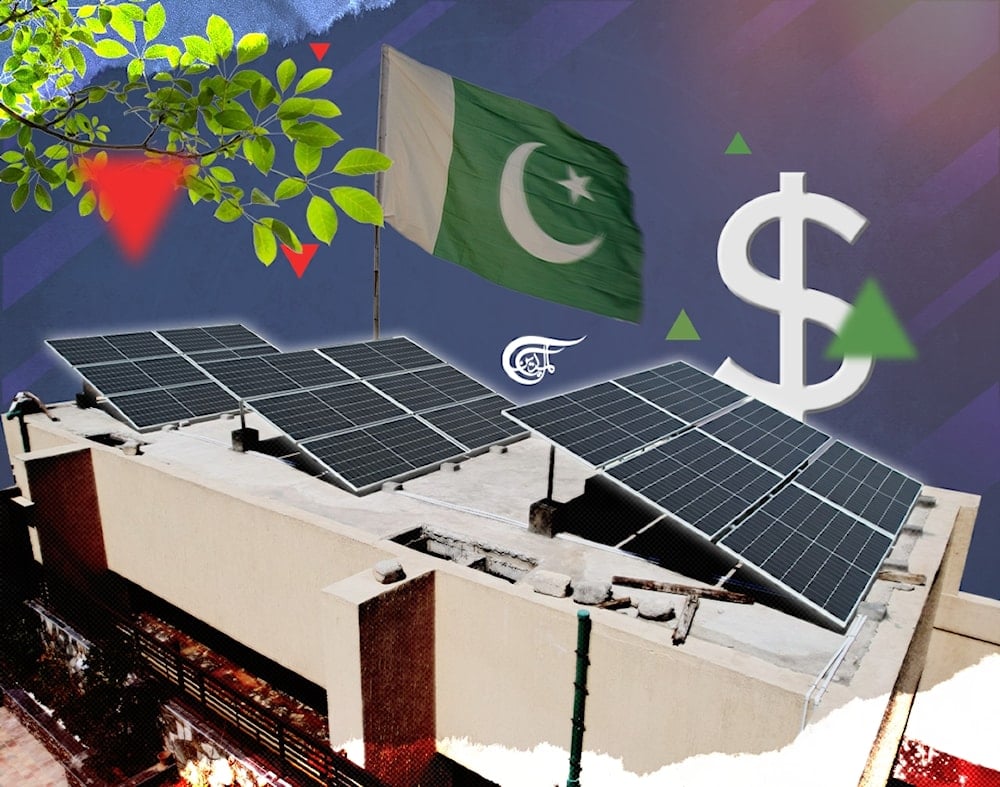The rooftop revolution: Pakistan’s unnoticed solar uprising
The future of Pakistani energy requires the state to acknowledge that independent management of energy lies beyond the ministry's central control and utility operations.
-

Pakistan’s unnoticed solar uprising (Illustrated by Ali al-Hadi Shmeiss; Al Mayadeen English)
In an era of escalating climate concerns, geopolitical flux, economic instability, rising tariffs, and Trumponomics, it is often assumed that governments are responsible for finding solutions to such problems, especially in the energy sector, and solutions should be financed and regulated by the top. Pakistan’s people in 2024 utterly defied this notion. With no significant government support, massive subsidies, and financial assistance or provisions from global funding or aid forums, Pakistan subtly grew to become one of the largest importers of solar panels on the planet. By last year’s end, Pakistan imported an overwhelming amount of solar panels worth 22Gigawatts (GW). These solar power systems have found their place on the rooftops of homes, as well as commercial buildings and educational institutions.
In order to make sense of what 22 GW worth of solar panels imported/installed in a single year means, one needs to understand that this number is actually higher than most of the climate change-conscious developed countries in the world. For example, 22 GW far exceeds Canada’s total installed capacity, let alone its annual additions. In fact, if we look at the UK, 22 GW exceeds the UK’s additions in the past 5 years. The surprising fact is that this energy transformation in Pakistan went under the radar of most Western media outlets. The amount of solar panels imported in Pakistan from 2021-2024 far exceeds 35 GW, and such numbers actually give people at the International Energy Agency (IEA) a shock. While energy policy makers in the US debated over challenges in integrating new renewable energy projects into the electrical grid due to lengthy interconnection queues and Europe bickered over allowing reforms, Pakistan leapfrogged over the melodrama and simply imported the panels from China and brought about a silent solar revolution.
The thing of note here is that national authorities had not planned these gleaming solar rooftop systems in Pakistan. The nation lacked both a public green energy master plan and a network of large-scale subsidies to promote solar power usage. This transformation occurred due to necessity rather than government planning, thus bringing Plato’s words of wisdom to reality. Plato suggested that “necessity is the mother of invention.” With an exponential rise in electricity rates in Pakistan, the people took matters into their own hands and started going off-grid, resorting to self-sufficiency through rooftop solar power systems and proving that adversity indeed drives innovation.
In order to understand this massive shift, one needs to take a peek into what has been happening over the past decades in Pakistan with regard to the energy sector. Pakistan has endured numerous problems in its energy sector throughout the decades. High power losses exist within the national power grid, going as high as 35% of the country’s total electricity production. There has also been load shedding to offset the gap between supply and demand, resulting in up to 12 to 16 hours of power outages in rural areas and 6 to 8 hours in urban centers, affecting millions, coupled with myopic solutions adopted by the government, which exacerbated the already rotting system of electricity provision. All this paved the way for a nationwide energy rebellion. Unlike most rebellions that end with destruction, this rebellion has been generative.
It’s important to note that the Pakistani people did not resort to installing solar panels on their rooftops out of their concern for climate change and green energy; rather, it was done for survival. The sheer magnitude of this change will definitely have extensive encouraging environmental consequences, despite the motives behind it. The people’s bid for survival has quickly developed into an energy paradigm shift that shows Pakistanis they should perceive energy as a commodity they can independently manage rather than remaining dependent on the government. This shift is actually a tale of resilience, adaptation, and quiet revolution in the developing South.
Policymakers, together with planners, experience extensive challenges while trying to adapt to this transformation. A recent publication by the UK-based think tank Ember substantiated that most (the vast majority) of Pakistan's 22 GW solar installations took place off the national grid. Individuals in Lahore, students in Karachi, and entrepreneurs in Faisalabad and across the country operate solar installations on their buildings, educational facilities, and industrial sites because they need alternative energy solutions from government services.
This energy shift creates significant effects in the system. The actual power generation in Pakistan differs significantly from official energy records, which indicates a serious reporting gap in energy monitoring systems. Official government records document lower solar installation metrics because enough off-grid infrastructure undercuts the tracked statistics. The actual figures are far higher than the Economic Coordination Committee (ECC) numbers released earlier, which shared that the total installed solar capacity in Pakistan grew from 321 MW in 2021 to 4,124 MW by December 2024. The difference between actual use and statistical recording of energy goes far beyond mere documentation failures. This phenomenon points toward extensive government policy failure.
The standard practice for energy planners involves working with centralized approaches that focus on planning five-year projects with foreign financing to construct large-scale infrastructure. Millions of people have already created their infrastructure by quite efficient means without expecting any tender process. The decentralized growth of energy development guided by citizens has proven difficult for the conventional instruments in traditional energy governance systems to handle.
The emerging modern energy market comes with various difficulties to navigate. High-value urban customers who have defected either partially or fully from the grid create a significant crisis for utility companies. Their revenue stream is declining, yet they must continue obligations to provide services to unprofitable rural areas. The financial viability of the grid is at risk because its current business model may lead to financial collapse, which would result in limited service for non-defecting consumers.
The rapid growth of the solar industry has led to a lack of focus on operating safety regulations, quality control, and storage capacities. Modern systems or distribution errors paired with transformer overloads and an inferior grid interface might result in future systematic operational issues. The quick success of solar projects through informal growth creates long-term challenges for sustainability because the state needs to develop its readiness to handle them.
Despite its lack of intention, the government played a role in preparing these circumstances, which led to the explosion. The relaxation of import restrictions, together with both a weaker value of the rupee and increasing energy expenses, established solar energy as a smart financial choice. The solar market was dominated by Chinese production, which drove energy from solar to become cheaper than diesel, as well as grid electricity for numerous consumers. Such results emerged independently from environmental support or climate-based movements. It was simple economics.
The reverse transformation provides useful lessons for other nations struggling with similar power sector problems. The clean energy transition proved possible in Pakistan through low barriers and favorable prices, even technology leapfrogging. The current global climate policy talks tend to present developing nations only as receivers of top-down policy guidelines. Pakistan demonstrates an opposite approach to standard norms. Pakistan’s example serves as a case study for the Global South about leading independent changes and initiatives.
The state needs to reestablish itself through enabling policies that should avoid controlling energy systems. The future of Pakistani energy requires the state to acknowledge that independent management of energy lies beyond the ministry's central control and utility operations. The energy source exists within residential and rooftop areas. In order to guarantee that off-grid adopters contribute to grid stability when necessary, the adoption of such new regulatory thinking should encourage local energy generation while making investments in smart grids and battery storage.
Updated data systems must be constructed to identify the extent of these changes in real-time. Effective energy planning requires new quantitative measures that must consider the current experiences of vast populations. For greater inclusion, real-time energy mapping systems that combine community involvement and mobile technology should be created.
If one views major cities in Pakistan through Google Earth, the glittering solar panels can easily be noticed on rooftops. It’s important for the world to take note that these shining rooftops across Pakistan are evidence of a silent but powerful revolution, in which adversity drove ingenuity and people exhibited resilience in the face of government neglect and rejected the notion of being left in the dark. To conclude, “The Sun rises even when the system fails."

 Shafei Moiz Hali
Shafei Moiz Hali
 8 Min Read
8 Min Read











